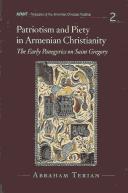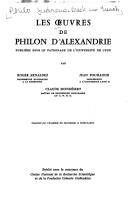| Listing 1 - 10 of 10 |
Sort by
|
Book
ISBN: 9780199541560 0199541566 Year: 2008 Publisher: Oxford: Oxford university press,
Abstract | Keywords | Export | Availability | Bookmark
 Loading...
Loading...Choose an application
- Reference Manager
- EndNote
- RefWorks (Direct export to RefWorks)
Apocryphal infancy Gospels --- 229*412 --- 229*413 --- 229*412 Evangelie van Jezus' jeugd. Slavisch evangelie van Petrus --- Evangelie van Jezus' jeugd. Slavisch evangelie van Petrus --- 229*413 Proto-evangelie van Jacobus --- Proto-evangelie van Jacobus --- Infancy Gospels, Apocryphal --- Apocryphal Gospels --- Evangile de l'Enfance --- Arménien

ISBN: 9780881412932 0881412937 Year: 2005 Publisher: Crestwood: St Vladimir's seminary press,
Abstract | Keywords | Export | Availability | Bookmark
 Loading...
Loading...Choose an application
- Reference Manager
- EndNote
- RefWorks (Direct export to RefWorks)
"Armenian Christianity manifests a unique blend of patriotism and piety - given its ethnic character from the outset and the fact of its having survived the unfavorable currents of history. Beginning from the inception of Armenian letters at the turn of the fifth century, the author surveys that blend in ancient Armenian sources spanning a thousand years. He shows how the theme finds its fullest manifestation as a literary motif in the medieval panegyrics dedicated to St. Gregory the Illuminator, founder of the Armenian Church at the dawn of the fourth century. Of these, the panegyric by Hovhannes of Erzenka (a prolific author of the thirteenth century) exhibits all the characteristics of the motif in ancient Armenian literature. Consequently, his work receives ample coverage in this unique study, including a translation of the entire text with commentary. Annotated selections from the other panegyrics on St. Gregory complete the book, the second volume in the AVANT series devoted to the study of the Armenian Christian heritage."--Jacket.
Armeense Kerk. --- Panegyrikus. --- Vaderlandsliefde. --- Vroomheid. --- Gregory, --- Gregor (der Erleuchter). --- Armenian Church --- Armenian Church. --- Armenische Apostolische Kirche. --- History. --- Geschichte 600-1300. --- Armenia --- Asia --- Church history. --- Gregorius Illuminator, ep. Magnae Armeniae --- Gregory, - the Illuminator, Saint, - ca. 240-ca. 332 --- Armenia - Church history --- 276 =919.81 --- 281.6 --- 281.6 Armeense Kerk --- Armeense Kerk --- Armeense patrologie --- Gregorius de Verlichter --- Grégoire l'Illuminateut --- Gregory the Illuminator --- Gregory --- Ghrīghūriyūs, --- Grégoire, --- Gregor, --- Gregorius Illuminator, --- Gregorius, --- Grigor I, --- Grigor, --- Krikor, --- Hayastaneaytsʻ S. Ekeghetsʻi --- Armenian Apostolic Orthodox Church --- Hay Aṛakʻelakan Ekeghetsʻi --- Eglise apostolique arménienne --- Hayotsʻ Ekeghetsʻi --- Hay Ekeghetsʻi --- Hayastaneaytsʻ Ekeghetsʻi --- Hayastaneaytsʻ Aṛakʻelakan Ekeghetsʻi --- Armenian Apostolic Church --- Armenische Kirche --- Biserica armeană --- Armenikē Ekklēsia --- Hayastaneaytsʻ Aṛakʻ. Surb Ekeghetsʻi --- Armi︠a︡nskai︠a︡ Apostolʹskai︠a︡ T︠S︡erkovʹ --- Армянская Апостольская Церковь --- Armenische Apostolische Kirche --- Hayasdan --- Hayastan --- Aĭastan --- Haykʻ Metskʻ --- Mets Haykʻ --- Greater Armenia --- Armenia (Republic)
Book
ISBN: 0814684645 9780814684641 9780814684894 Year: 2021 Publisher: Collegeville: Liturgical press,
Abstract | Keywords | Export | Availability | Bookmark
 Loading...
Loading...Choose an application
- Reference Manager
- EndNote
- RefWorks (Direct export to RefWorks)
St. Gregory of Narek (ca. 945–1003), Armenian mystic poet and theologian, was named Doctor of the Church by Pope Francis on April 12, 2015. Not so well known in the West, the saint holds a distinctive place in the Armenian Church by virtue of his Prayer Book and hymnic odes—among other works. His writings are equally prized as literary masterpieces, with the Prayer Book as the magnum opus. With this meticulous translation of the prayers, St. Gregory of Narek enters another millennium of wonderment, now in a wider circle. The prayers resound from their author’s heart—albeit in a different language, rendered by a renowned translator of early Armenian texts and a theologian.
Christian poetry, Armenian --- Christian poetry --- Christianity --- Christian literature --- Religious poetry --- Hymns --- Armenian Christian poetry --- Armenian poetry --- 264.016 --- 281.6 --- 264.016 Armeense liturgie --- Armeense liturgie --- 281.6 Armeense Kerk --- Armeense Kerk
Book
ISBN: 9789042925076 9042925078 Year: 2012 Volume: 14 Publisher: Leuven: Peeters,
Abstract | Keywords | Export | Availability | Bookmark
 Loading...
Loading...Choose an application
- Reference Manager
- EndNote
- RefWorks (Direct export to RefWorks)
Composed by Grigor Magistros, an 11th-century Armenian princely savant and friend of the Byzantine Emperor Constantine IX Monomachus (reigned 1042–55), the Magnalia Dei is a summation of the Bible in epic verse. Written on one of the author’s visits to Constantinople, it resulted from an encounter there with a Moslem intellectual by the name of Manazi — none other than Abu Nasr al-Manazi, vizier and emissary of the Abbasid Caliphate, theologian and poet, who frequently visited Constantinople in quest of Greek scientific manuscripts. During their discussion on the Bible and the Qur’an, a stock Islamic argument emerged: that the Qur’an is superior to the Christian Scriptures on account of its beautiful, inimitable verse. The epic is Magistros’s response. The Magnalia Dei is the earliest literary epic in medieval Armenian, and one of the most informative compositions within the genre of biblically inspired verse narratives in Christian literature.
22.09 --- Gewijde geschiedenis. Parafrasen op de bijbel --- Altarmenisch. --- Versdichtung. --- Bibelepik. --- Grigor --- Bible --- Bible. --- Grigor,
Book
ISBN: 9780881413236 0881413232 Year: 2008 Volume: 4 4 Publisher: Crestwood, N.Y.: St Vladimir's seminary press,
Abstract | Keywords | Export | Availability | Bookmark
 Loading...
Loading...Choose an application
- Reference Manager
- EndNote
- RefWorks (Direct export to RefWorks)
Sacraments --- Armenian Church --- Macarius, --- History --- 276 =75 "03" --- Ecclesiastical rites and ceremonies --- Church --- Grace (Theology) --- Rites and ceremonies --- Armenian Church. --- Griekse patrologie--?"03" --- Hayastaneaytsʻ S. Ekeghetsʻi --- Armenian Apostolic Orthodox Church --- Hay Aṛakʻelakan Ekeghetsʻi --- Eglise apostolique arménienne --- Hayotsʻ Ekeghetsʻi --- Hay Ekeghetsʻi --- Hayastaneaytsʻ Ekeghetsʻi --- Hayastaneaytsʻ Aṛakʻelakan Ekeghetsʻi --- Armenian Apostolic Church --- Armenische Kirche --- Biserica armeană --- Armenikē Ekklēsia --- Hayastaneaytsʻ Aṛakʻ. Surb Ekeghetsʻi --- Armi︠a︡nskai︠a︡ Apostolʹskai︠a︡ T︠S︡erkovʹ --- Macarius --- Macarius (Hierosolymitanus, I.). --- Canones Macarii Hierosolymitani (Macarius, Bishop of Jerusalem). --- Армянская Апостольская Церковь --- Armenische Apostolische Kirche --- Sacraments - Armenian Church --- Macarius, - Bishop of Jerusalem, - 4th cent. - Canones Macarii Hierosolymitani
Book
ISBN: 0814663184 9780814663189 9780814663431 Year: 2016 Publisher: Collegeville, Minnesota: Liturgical press,
Abstract | Keywords | Export | Availability | Bookmark
 Loading...
Loading...Choose an application
- Reference Manager
- EndNote
- RefWorks (Direct export to RefWorks)
This is the first translation in any language of the surviving corpus of the festal works of St. Gregory of Narek, a tenth-century Armenian mystic theologian and poet par excellence (d. 1003). Composed as liturgical works for the various Dominical and related feasts, these poetic writings are literary masterpieces in both lyrical verse and narrative. Unlike Gregory’s better-known penitential prayers, these show a jubilant author in a celebratory mood. In this volume Abraham Terian, an eminent scholar of medieval Armenian literature, provides the nonspecialist reader with an illuminating translation of St. Gregory of Narek’s festal works. Introducing each composition with an explanatory note, Terian places the works under consideration in their author’s thought-world and in their tenth-century landscape.
Christian poetry, Armenian --- Grigor, - Narekatsʻi, Saint, - 951-1003 --- Grigor, --- Armenian Church --- Liturgy
Book
Year: 1995 Publisher: Jerusalem: Hebrew university of Jerusalem. Institute of Asian and African studies,
Abstract | Keywords | Export | Availability | Bookmark
 Loading...
Loading...Choose an application
- Reference Manager
- EndNote
- RefWorks (Direct export to RefWorks)
Book
ISBN: 089130472X 0891304738 9780891304722 Year: 1981 Volume: 1 Publisher: Chico: Scholars Press,
Abstract | Keywords | Export | Availability | Bookmark
 Loading...
Loading...Choose an application
- Reference Manager
- EndNote
- RefWorks (Direct export to RefWorks)
Zoology --- Zoologie --- Pre-Linnean works --- Ouvrages prélinnéens --- Ouvrages prélinnéens --- Zoology - Pre-Linnean works

ISBN: 2204030406 9782204030403 Year: 1988 Volume: 36 Publisher: Paris: Cerf,
Abstract | Keywords | Export | Availability | Bookmark
 Loading...
Loading...Choose an application
- Reference Manager
- EndNote
- RefWorks (Direct export to RefWorks)
Book
Year: 1981 Publisher: Chico (Calif.): Scholars Press,
Abstract | Keywords | Export | Availability | Bookmark
 Loading...
Loading...Choose an application
- Reference Manager
- EndNote
- RefWorks (Direct export to RefWorks)
| Listing 1 - 10 of 10 |
Sort by
|

 Search
Search Feedback
Feedback About UniCat
About UniCat  Help
Help News
News